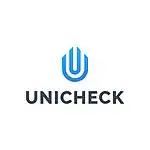Unicheck
Unicheck (previously known as Unplag) is a cloud-based plagiarism detection software that finds similarities, citations and references in texts.
 | |
Type of site | Plagiarism and Similar Content Checker |
|---|---|
| Owner | Unicheck.com |
| URL | unicheck |
| Commercial | Yes |
| Current status | Active |
Unicheck is primarily used in K-12 and higher education, and is utilised by more than 400 institutions worldwide.[1] The tool is also used as a stand-alone checker by individual users like writers, editors, bloggers and lawyers.[2]
History
Unicheck was produced and launched by an IT company Phase One Karma in 2014 under the name Unplag.[3] In 2016 Unicheck partnered with the XСulture project and became a Certified Partner with the Canvas learning management system by Instructure [4] (in 2017 it gained a status of Canvas Alliance Partner).[5] In the summer of 2017, Unicheck became the first plagiarism checker to integrate with Google Classroom.[6] It has also released a new type of integration with Canvas, called “native” and based on both LTI and API. After that in January 2018 Unicheck released Add-on for Google Docs.[7]
In 2020 Unicheck created by Phase One Karma was acquired by Turnitin. Unicheck will continue to operate as a separate plagiarism service for educational institutions around the world. Unicheck and Turnitin share the goal of continuously improving and innovating products for 38,000,000 students in 16,000 institutions.
Functionality
Unicheck offers search and recognition functionality for similarities, citations, and references in texts. It can also discover characters that have been replaced in the text from another alphabet — for example, similar characters from the Cyrillic and Latin alphabets. To find similarities and paraphrases, checks are performed against the Internet (web pages indexed by Yahoo and Google), open source repositories, and user's internal library or database. The check results are presented as a similarity report, where each of the similarities that have been found has a link to the source. These reports can be downloaded as PDF documents.
Unicheck can be used as a stand-alone online tool, or integrated into an LMS (Learning Management System) via plugin, LTI, API or LTI+API types of integrations.
Unicheck is compatible with the following file formats: .doc, .docx, .rtf, .txt, .odt, .ppt, .pptx, .html, .pdf, .pages, .gdoc, as well as rar and zip archives, and files uploaded from Google Drive, oneDrive and Dropbox.[8] Unicheck allows users to store documents in their internal library. Global settings allow adjustment of check sensitivity and enable users to choose whether they want to share their checked documents with Unicheck's database.[8] Each newly signed up user receives 5 trial pages.
Technology
Unicheck uses an algorithm that searches for similar text on web pages, in open source repositories, and in the user's internal library. Accuracy of search is achieved by using the algorithm that divides text into small shifting sequences and uses them to look for similarities and by using live web index, which enables checks against all web pages.[9]
The technology was developed by computer science engineers and professors. In 2017, the technology was improved by adding NLP (Natural Language Processing) principles. This enabled the system to recognise synonyms and find paraphrased content in the checked text. The algorithm has been compared to latent semantic indexing, a method used by Google to determine connections between words and phrases.[10]
The technology can recognise citations and references in the text, given they are properly formatted according to any of the academic styles. Currently, the technology recognizes APA, MLA, Chicago, Turabian, and Harvard styles. The speed of checks per page is 4 seconds.
Integrations
Unicheck has developed the following types of integrations with Learning Management Systems (LMS):
Plugin integration is characterised by enriching LMS functionality with added features of the tool, without changing native interface. This type of integration is used with Moodle and Sakai LMS.
LTI integration is characterised by a completely new interface created within the LMS to enable Unicheck's functions. Unicheck developed this type of integrations for Canvas, Moodle, Schoology, Blackboard, and NEO LMS.
When this type of integration is used, the two systems, that of LMS and Unicheck, are connected by API to ensure their interaction. API works through determining the functionality of the system, at the same time disregarding the way that functionality is realised. Through this type of interaction, Unicheck integrates with Google Classroom.
LTI+API
This is a special type of integration that takes principles of both API and LTI to create a native integration, that is presenting Unicheck's functions in the native interface of LMS. This type of integration is only available for Canvas LMS.
References
- https://talentapestry.com/how-it-works-client/plagiarism-free-promise/
- Huffman, Justin (7 August 2015). "How Lawyers Fight Plagiarism". Guardian Liberty Voice. Retrieved 7 August 2015.
- "Unicheck profile". Crunch Base. Retrieved 3 August 2015.
- korzh, Alisa. "Unicheck Launches Deep Integration With Canvas LMS - eLearning Industry". eLearning Industry. Retrieved 2017-11-03.
- "Alliance Partner - Unicheck | Canvas Community". community.canvaslms.com. Retrieved 2017-11-03.
- "Plagiarism Checker Unicheck And Google Classroom Integration". Unicheck Blog. 2017-06-23. Retrieved 2017-11-03.
- "Unicheck Similarity Checker Add-On for Google Docs". Unicheck Blog. 2018-02-09. Retrieved 2018-03-01.
- Horvath, Brian (24 August 2015). "Get Higher Content Quality With These Three Tools". Business 2 Community. Retrieved 26 August 2015.
- Marchenko, Oleksandr; Anisimov, Anatoly; Nykonenko, Andrii; Rossada, Tetiana; Melnikov, Egor (2017-06-21). Authorship Attribution System. Natural Language Processing and Information Systems. Lecture Notes in Computer Science. Springer, Cham. pp. 227–231. doi:10.1007/978-3-319-59569-6_27. ISBN 9783319595689.
- Marchenko, Oleksandr; Anisimov, Anatoly; Nykonenko, Andrii; Rossada, Tetiana; Melnikov, Egor (2017-06-21). Machine Learning Method for Paraphrase Identification. Flexible Query Answering Systems. Lecture Notes in Computer Science. Springer, Cham. pp. 164–173. doi:10.1007/978-3-319-59692-1_14. ISBN 9783319596914.